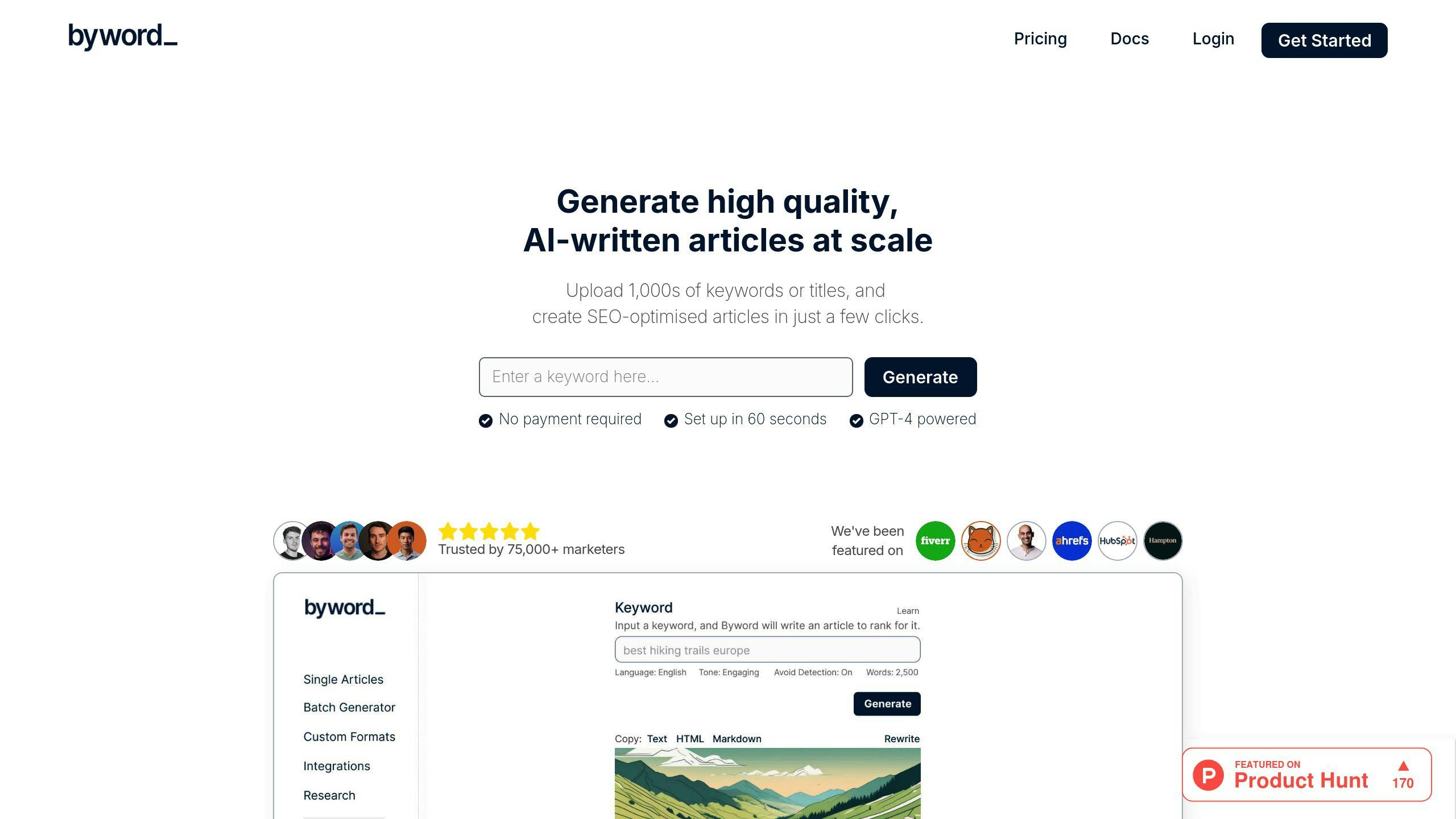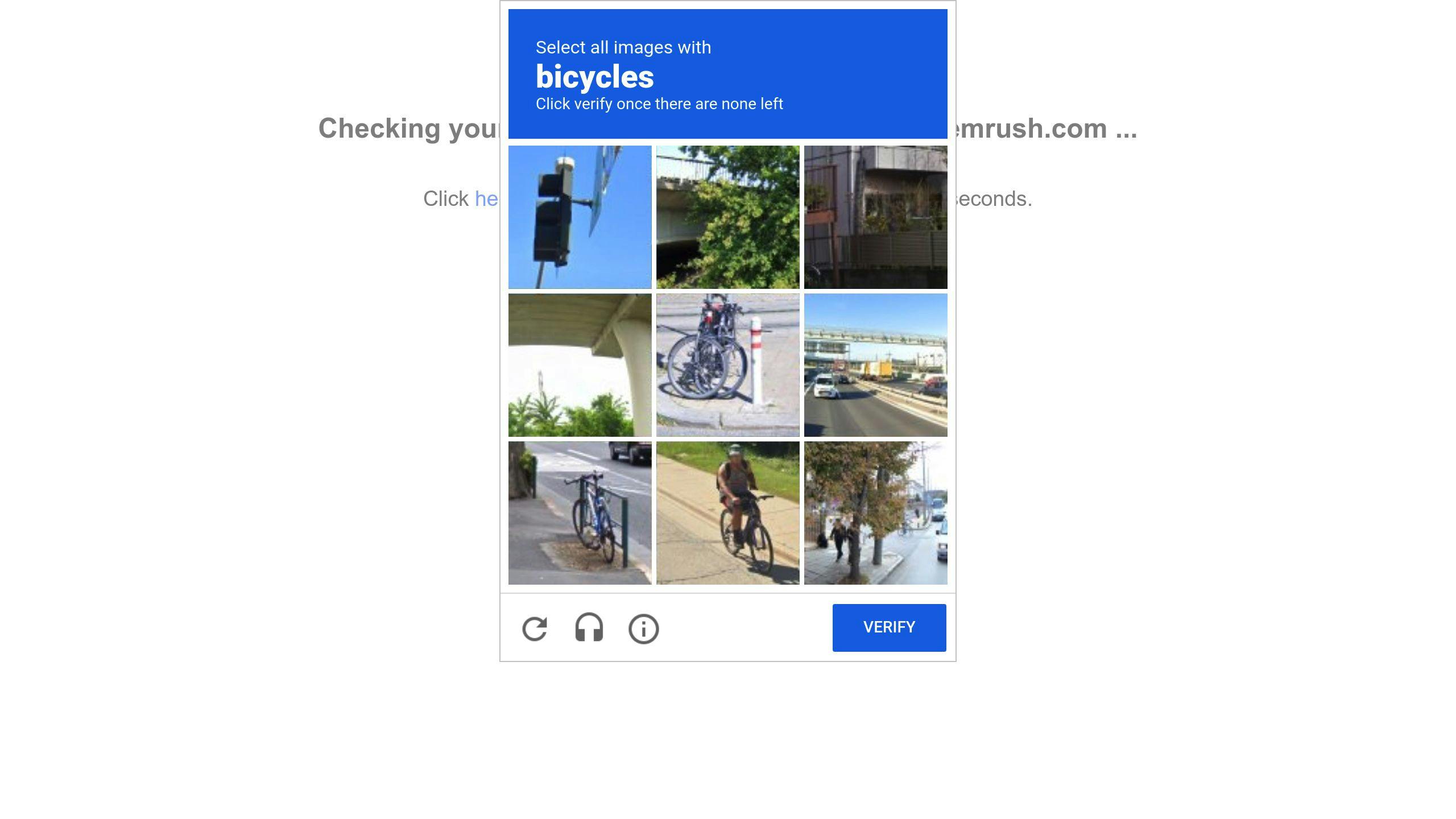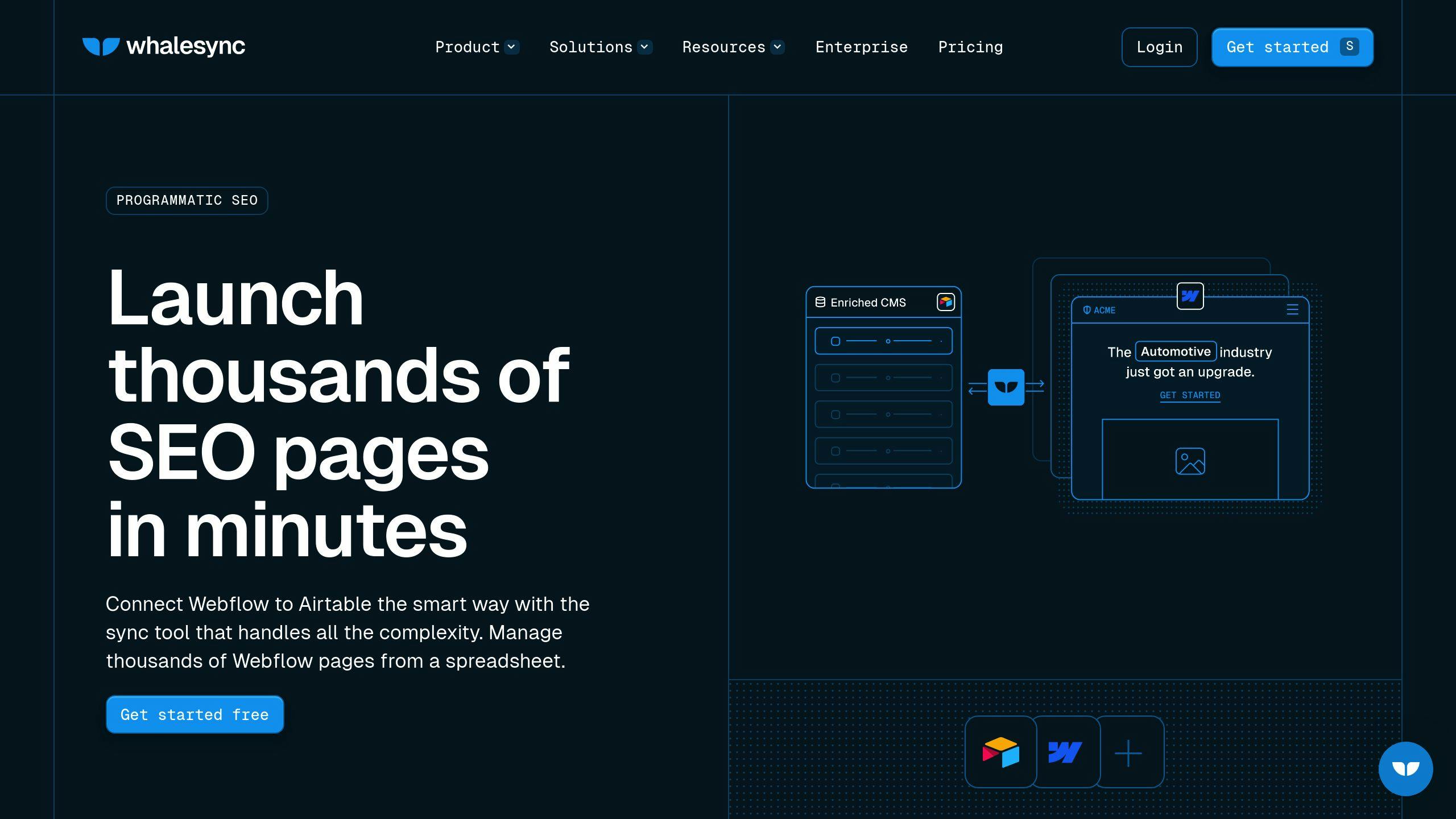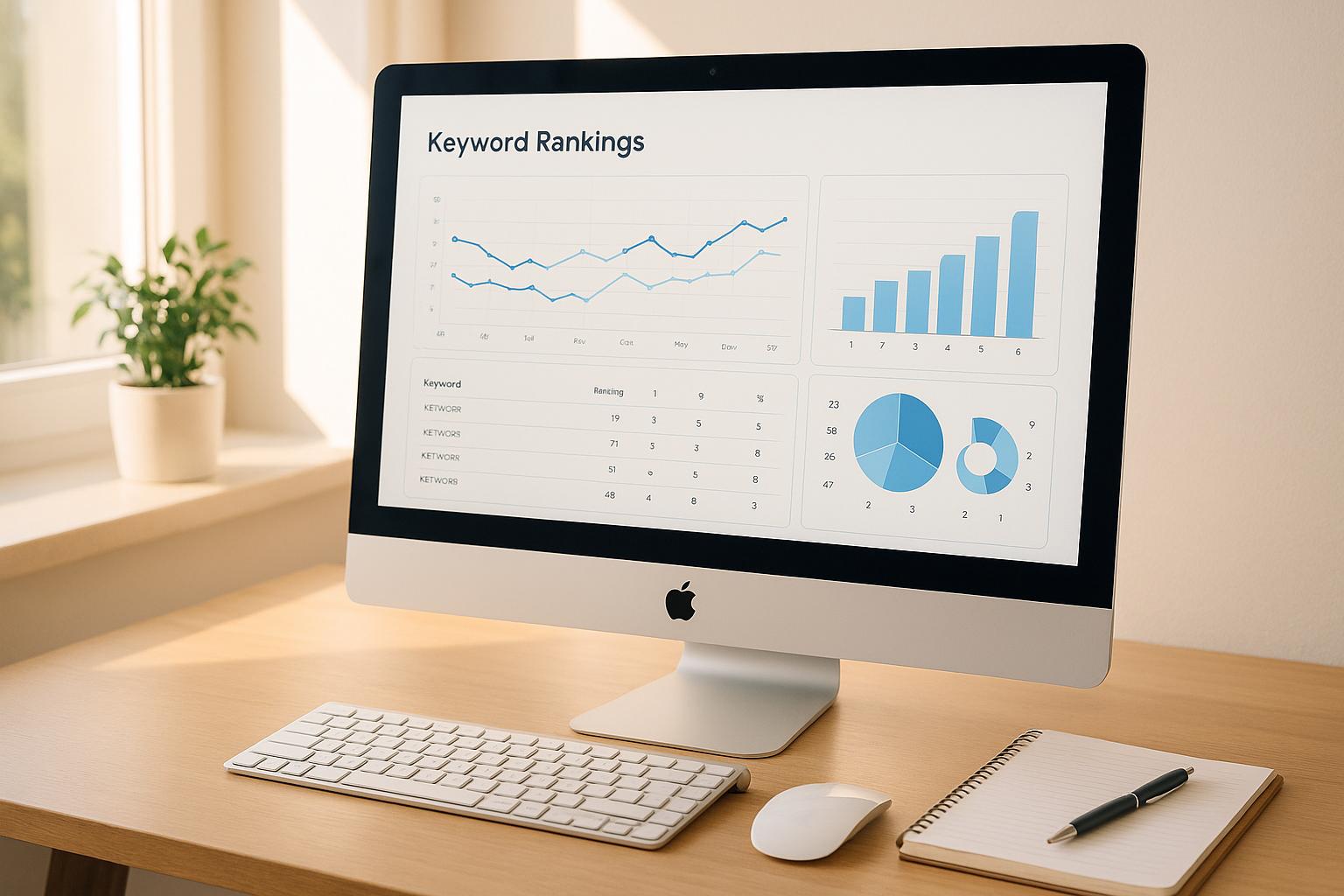Looking for the best programmatic SEO tools to scale your content strategy in 2025? Here’s a quick rundown of the top tools that automate SEO tasks like keyword research, content creation, and performance tracking - all while saving you time and effort.
Key Tools to Explore:
- Byword.ai: AI-powered bulk content creation and keyword optimization.
- Engyne: Smart workflows for large-scale campaigns, ideal for e-commerce.
- Semrush: Comprehensive SEO tool with advanced analytics and keyword research.
- Ahrefs: Best for backlink analysis and competitor insights.
- Ubersuggest: Budget-friendly option for small businesses.
- WhaleSync: Automates data syncing and large-scale page generation.
- Eugyne: Focuses on schema markup and technical SEO.
- Google Analytics: Essential for tracking programmatic SEO performance.
- Canva: Scalable design tools for SEO-friendly visuals.
- Perplexity: AI-driven content generation with advanced performance tracking.
Quick Comparison Table:
| Tool | Starting Price | Key Features | Best For |
|---|---|---|---|
| Byword.ai | $149/month | Bulk content creation, templates | Large-scale content ops |
| Engyne | $199/month | Workflow automation, meta tags | E-commerce sites |
| Semrush | $119.95/month | Keyword research, audits, tracking | All-in-one campaigns |
| Ahrefs | $99/month | Backlink analysis, rank tracking | Link building |
| Ubersuggest | $29/month | Keyword suggestions, site audits | Small businesses |
| WhaleSync | $179/month | Data syncing, automation | Data-heavy SEO |
| Eugyne | $159/month | Schema markup, technical SEO | Technical SEO tasks |
| Google Analytics | Free | Traffic and performance tracking | Data analysis |
| Canva | Free/Premium | Visual content creation, templates | Visual SEO content |
| Perplexity | $189/month | AI content scaling, audits | Enterprise SEO |
These tools cater to businesses of all sizes, helping you automate repetitive tasks, improve search rankings, and scale your SEO efforts efficiently. Let’s dive deeper into each tool and its features.
15 Programmatic SEO Tools for 2025
1. Byword.ai Overview

Byword.ai uses artificial intelligence to streamline the creation of SEO-focused content at scale. It’s designed to automate content production while keeping quality intact, making it ideal for large-scale projects [1].
Here’s what the platform offers:
- Bulk Page Creation: Quickly generates multiple SEO-friendly pages to meet extensive content requirements [1].
- AI Content Generation: Produces keyword-rich articles using advanced algorithms [2].
- Keyword Optimization: Places keywords strategically for better visibility and natural readability [1].
- Performance Tracking: Delivers analytics to evaluate content success and SEO metrics [1].
Byword.ai has a 3.5/5-star rating on G2, reflecting its dependable performance in programmatic SEO [2]. It works well with technical SEO strategies, automating tasks like meta tags and schema markup, while ensuring consistency across all content [3].
The platform’s intuitive interface allows marketing teams to scale content production, automate repetitive processes, and track SEO performance across multiple pages - all without compromising on quality. Its efficient system is particularly useful for businesses with large-scale content needs [1].
Byword.ai sets a solid benchmark in programmatic SEO tools, paving the way for platforms like Engyne to build on its strengths.
2. Engyne Features
Engyne is a programmatic SEO tool that combines AI-powered content creation with in-depth keyword research. It’s designed to handle large-scale SEO campaigns efficiently through automation and smart workflows.
Content Creation at Scale
Engyne’s AI generates hundreds of SEO-friendly pages quickly, while human oversight ensures quality. This is especially useful for e-commerce sites that require extensive product descriptions.
Smart Keyword Research
Engyne’s keyword tools analyze competitor data to find high-value search terms. It focuses on long-tail keywords to attract targeted traffic and uncover new opportunities. This AI-driven approach helps businesses remain competitive in the ever-changing SEO world.
Streamlined Workflow Automation
Engyne simplifies campaign management with features like:
- Template-based page creation
- Meta tag optimization
- Direct publishing
- Built-in quality checks
Performance Tracking
Get weekly ranking updates and real-time metrics to fine-tune strategies on the go.
Seamless Integrations
Engyne works with platforms like Google Analytics and SEMrush, making it easier to consolidate data and refine your SEO plans.
3. Semrush Capabilities

Semrush is a go-to tool for programmatic SEO, offering a mix of automation and in-depth analytics tailored for large-scale SEO strategies.
Advanced Keyword Research
The Keyword Magic Tool helps identify long-tail, high-traffic keywords by analyzing search trends and competitors, ensuring your content attracts the right audience.
Streamlined Content Optimization
Semrush simplifies content improvement with tools like content templates, bulk optimization suggestions, and automated technical checks, including meta tag creation.
Performance Tracking
With tools like Site Audit and Position Tracking, Semrush gives you real-time updates on rankings, technical issues, and backlink opportunities. It even integrates with Google Search Console, offering deeper insights compared to competitors like Engyne.
Seamless Integration
Connects effortlessly with Google tools, allowing you to centralize data and refine strategies more efficiently.
Pricing
Plans start at $139.95 per month [5], catering to businesses of various sizes with scalable options.
Technical SEO Automation
Handles tasks like page speed checks and schema markup automatically, making it easier to ensure technical SEO compliance for large websites. Its bulk analysis capabilities also cover critical factors like mobile responsiveness and page speed.
By automating complex SEO tasks, Semrush allows businesses to channel their energy into growth strategies while maintaining strong search rankings. With a G2 rating of 4.5/5 [2], it’s a trusted solution for scaling SEO efforts.
Next, we’ll dive into Ahrefs, another top-tier tool for programmatic SEO.
4. Ahrefs Tools

Ahrefs is a go-to tool for those looking to scale their programmatic SEO efforts. From keyword research to backlink analysis, it offers a range of features tailored for optimizing content at scale.
Backlink Analysis That Delivers
Ahrefs boasts an extensive backlink database and advanced crawling abilities, making it an excellent choice for analyzing link profiles and spotting link-building opportunities.
Content Insights and Competitor Analysis
With the Content Explorer, you can find top-performing content in your niche. The Gap Analysis tool highlights areas where competitors are gaining traction, helping you shape an informed content strategy.
Keyword Research Across Platforms
Ahrefs' Keyword Explorer provides detailed insights into search volume, competition, and click metrics across platforms like Google, YouTube, and Amazon. This versatility sets it apart from many other tools [4].
Site Audits Made Simple
The Site Audit tool tackles key issues like broken links and problematic meta tags. However, its technical SEO features are somewhat limited compared to competitors like Semrush.
Pricing Options
Plans start at $108/month for basic features and can go beyond $1249/month for enterprise-level access, which includes API usage and custom limits [6].
Track Performance with Ease
The Rank Tracker monitors your site's positions across different locations and devices, offering insights into ranking shifts and new SERP opportunities - perfect for scaling programmatic SEO campaigns.
With a 4.5/5 rating on G2 [4], Ahrefs is highly regarded for its capabilities in backlink analysis and content research. It's especially useful for managing large-scale websites and multiple projects.
Next, we’ll take a look at Ubersuggest, a tool known for combining simplicity with powerful SEO features.
5. Ubersuggest Insights

Ubersuggest is a straightforward choice for businesses stepping into SEO automation, offering a range of tools designed to scale SEO efforts with ease.
Keyword Research and Optimization
The tool combines keyword discovery with its "Related Keywords" feature, providing data on search volume and competition. This helps businesses identify new opportunities to target for programmatic SEO campaigns.
AI-Powered Content Generation
With its AI-driven content creation feature, Ubersuggest helps businesses produce consistent content, even when working with tight budgets.
Performance Tracking Dashboard
The platform includes a dashboard that monitors key metrics like:
- Keyword ranking changes
- Organic traffic patterns
- Content performance
- Competitor activity
Bulk Page Generation
For businesses managing large product catalogs or services, Ubersuggest simplifies the creation of multiple pages, making it ideal for programmatic SEO.
Integration Capabilities
Ubersuggest works seamlessly with tools like Google Analytics, allowing users to export keyword data for deeper analysis.
Freemium Advantage
One standout feature is its freemium model. While premium features offer advanced options, the free version provides enough tools to support basic optimization efforts, making it a great starting point for businesses new to programmatic SEO.
Ubersuggest's user-friendly design makes it a strong choice for those looking to build large-scale SEO strategies from the ground up [1]. It’s particularly well-suited for businesses aiming to expand their digital reach in 2025.
Up next, we’ll dive into WhaleSync, a tool focused on efficient data synchronization for programmatic SEO strategies.
sbb-itb-5be333f
6. WhaleSync Overview

WhaleSync simplifies the process of creating large numbers of pages, making it a go-to tool for businesses handling extensive product catalogs or location-based content. It allows users to generate multiple SEO-friendly pages at once, ensuring high standards while saving both time and effort [1].
Using AI, WhaleSync automates tasks like writing meta titles, setting up structured data, and optimizing keywords. This ensures consistency with search engine rules while integrating smoothly into existing workflows. Unlike other tools, it handles complex SEO tasks without sacrificing content quality [3].
Its keyword research tools help identify valuable keywords and reveal competitive gaps, aiding in strategic content planning. The platform also features a dashboard that tracks key metrics like keyword rankings, organic traffic, technical issues, and content performance. These insights make it easier to refine and improve SEO strategies.
What sets WhaleSync apart is its ability to integrate seamlessly into advanced workflows, making it a strong choice for teams managing large-scale projects. It adheres to SEO best practices, such as maintaining proper keyword density, ensuring mobile-friendly designs, and using structured content formats. Even when scaling to hundreds of pages, the system ensures the output remains top-notch [1].
With its automation and integration capabilities, WhaleSync is a strong tool for scaling SEO campaigns effectively. Up next, we'll take a closer look at Eugyne, another tool reshaping programmatic SEO.
7. Eugyne Features
Eugyne simplifies scaling content operations with automation tools designed to maintain quality and ensure compliance. Its bulk page generation feature works seamlessly with CMS platforms, using advanced templates to produce content efficiently while avoiding duplication issues.
The platform includes a powerful keyword optimization toolkit that uncovers search opportunities through detailed analysis. Automated workflows take care of meta tags, internal linking, keyword usage, and technical SEO across multiple pages, saving time and effort.
With an integrated dashboard, Eugyne provides performance tracking and insights to support data-driven decisions. It also connects effortlessly with popular SEO tools like Google Analytics and SEMrush, combining data from various sources to strengthen campaigns [1].
To make complex SEO tasks easier, Eugyne offers tutorials and documentation for straightforward troubleshooting. It handles user-generated content with ease, automating the creation of SEO-friendly pages to boost rankings and enhance user engagement [3].
8. Google Analytics for SEO
Google Analytics isn't a content creation tool, but it’s essential for tracking and improving programmatic SEO efforts. Its connection to other Google services makes it a go-to platform for monitoring automated SEO campaigns effectively.
The Organic Search and Landing Pages reports let you track how programmatically generated content performs. They highlight which templates are driving traffic and conversions, offering insights into what works best.
You can dig even deeper with tools like Landing Pages reports and Custom Segments, which provide a closer look at audience engagement and help fine-tune automated content. Real-time monitoring also allows you to catch and address issues on your programmatic pages as they happen.
Custom dashboards make it easy to keep an eye on key metrics for programmatic SEO. Combining Goal Tracking with the Organic Search report gives you a clear view of conversion rates and page performance.
When paired with Google Search Console, you gain access to detailed keyword performance data. This helps you see how programmatic content ranks for specific search terms and pinpoints areas where templates can be improved.
For larger-scale needs, Google Analytics 360 offers extras like BigQuery Export, which supports in-depth analysis of massive datasets. It also excels at tracking technical SEO metrics - think page load times, mobile usability, and user engagement - ensuring your programmatic content performs consistently.
With its powerful tracking and integration features, Google Analytics is a must-have for programmatic SEO. Up next, we’ll look at how Canva supports SEO through its content creation tools.
9. Canva for Content

Canva plays a key role in programmatic SEO strategies in 2025 by streamlining image optimization and offering scalable design tools. By incorporating Canva into workflows, businesses can align their visual content with SEO objectives, boosting both efficiency and performance.
The platform's Design Hub provides templates tailored for creating SEO-friendly visuals at scale. These templates help maintain consistent design across numerous landing pages and blog posts - a must for programmatic SEO efforts.
Features like automated alt text, color contrast adjustments, and image compression not only enhance SEO rankings but also improve user experience. With batch processing, teams can optimize multiple visuals at once, saving time during high-volume SEO campaigns.
The Brand Kit feature ensures that visuals remain consistent with a company's identity, which is critical for large-scale SEO projects.
| Feature | Benefit |
|---|---|
| Image Compression | Speeds up page load times |
| Brand Kit | Ensures consistent branding |
| Template System | Simplifies content scaling |
Canva's collaboration tools and API integrations make it easy for teams to design, optimize, and deploy visuals efficiently. Export settings allow for SEO-friendly file names and metadata, simplifying the rollout of large-scale content.
When paired with content management systems, Canva supports seamless deployment of optimized visuals across programmatically generated pages. Its API also enables automated image creation and optimization, making it a valuable tool for managing consistent visuals across thousands of pages.
Up next, we’ll dive into Perplexity, a tool that leverages AI insights for scalable programmatic SEO.
10. Perplexity Features
Canva may specialize in visual tools, but Perplexity is all about scaling programmatic SEO with the help of advanced AI automation and detailed analytics. It’s designed to tackle the challenge of producing large volumes of content without sacrificing quality.
Key Features
AI Content Generation: Perplexity’s AI engine crafts relevant content tailored to specific keywords and topics. It includes built-in quality checks to ensure consistency across massive content projects.
Keyword Intelligence: The platform analyzes real-time search trends and user behavior to identify keywords with high potential. This helps shape a more targeted content strategy.
| Feature | What It Does |
|---|---|
| AI Content Generation | Produces automated, consistent content at scale |
| Keyword Intelligence | Guides strategy with data from search trends |
| Performance Tracking | Measures ROI using custom metrics |
| Technical SEO Audit | Spots and fixes common programmatic SEO issues |
Performance Tracking takes a unique approach by focusing on metrics specific to programmatic content, offering insights into how templates perform and how well large-scale content strategies are working.
The Technical SEO Module automates audits, identifying common problems like duplicate content or missed opportunities in template optimization.
To ensure quality, Perplexity uses a hybrid Review System that blends AI-powered analysis with human oversight. This balance ensures that content meets high standards even at scale.
The platform also supports teams with flexible pricing, detailed tutorials, API guides, and round-the-clock customer service, making it easier to get the most out of your programmatic SEO efforts.
Perplexity’s range of tools and support make it a strong option for businesses looking to scale SEO efficiently. Up next, we’ll compare all the tools to help you decide which one is the best fit.
Comparison Table of SEO Tools
Here's a breakdown of popular SEO tools, including their pricing, features, and ideal use cases, to help you pick the one that fits your needs.
| Tool | Starting Price | Key Features | Best For | Strengths |
|---|---|---|---|---|
| Byword.ai | $149/month | • AI content generation • Template optimization • Bulk page creation |
Large-scale content ops | Advanced templating |
| Engyne | $199/month | • URL structure automation • Content scaling • Technical SEO checks |
E-commerce sites | Automated URL management |
| Semrush | $119.95/month | • Keyword research • Site audits • Competitor analysis |
Comprehensive campaigns | All-in-one functionality |
| Ahrefs | $99/month | • Backlink analysis • Content research • Rank tracking |
Link building strategies | Detailed backlink data |
| Ubersuggest | $29/month | • Keyword suggestions • Content ideas • Site audit |
Small businesses | Affordable pricing |
| WhaleSync | $179/month | • Data synchronization • API integration • Automated updates |
Data-focused SEO | Real-time updates |
| Eugyne | $159/month | • Content optimization • Schema markup • Page templates |
Technical SEO | Schema implementation |
| Google Analytics | Free | • Traffic analysis • User behavior insights • Performance metrics |
Data analysis | Google tool integration |
| Canva | Free/Premium | • Visual content creation • Template library • Brand kit |
Visual SEO content | Easy design tools |
| Perplexity | $189/month | • AI content scaling • Performance tracking • Technical audits |
Enterprise-level SEO | Advanced AI features |
This table simplifies the decision-making process, so you can match tools to your goals and budget.
Key Highlights
- Affordable Options: Ubersuggest is a great pick for startups or small businesses.
- All-in-One Solutions: Semrush and Ahrefs provide a complete package for SEO campaigns.
- Data Synchronization: WhaleSync focuses on real-time updates and seamless data integration.
Integration and Support
- Integration: Semrush and Ahrefs stand out with robust API integrations, while WhaleSync specializes in syncing data across platforms.
- Support: Both Semrush and Ahrefs offer extensive resources and round-the-clock customer service.
For more detailed insights and user reviews, check out resources like The Top SEO Marketing Directory (marketingseodirectory.com). This can help you see how these tools perform in actual use cases.
Next, we'll dive into the key takeaways from this comparison.
Final Thoughts
By 2025, programmatic SEO tools have become essential for boosting online visibility. Each tool caters to specific needs, offering various features and price points.
For larger organizations, Perplexity and Byword.ai stand out with their AI-powered bulk content creation capabilities. These tools are perfect for handling high-volume content requirements with advanced automation.
Mid-sized companies may prefer Semrush and Ahrefs for their well-rounded toolsets. These platforms cover everything from technical SEO to content strategy, making them ideal for businesses looking for all-in-one solutions.
For small businesses and startups, Ubersuggest is a budget-friendly option at $29/month. It provides the core features needed to get started without breaking the bank.
When choosing the right tool, keep these factors in mind:
- Match your budget to your business size and objectives.
- Evaluate your team's skill level and the tool's complexity.
- Ensure the tool integrates smoothly with your existing marketing tools.
If you're still unsure about which tool to pick, the Top SEO Marketing Directory (marketingseodirectory.com) offers detailed reviews and comparisons to help you make an informed decision.


